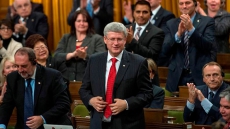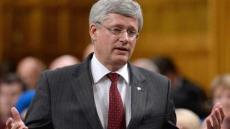VANCOUVER - A new Fraser Institute paper suggests that the recent stand-off between Netflix and the CRTC provides an opportunity for the government to dismantle barriers that prevent open competition in Canadian television broadcasting.
A senior fellow with the Fraser Institute, Steven Globerman, says existing regulatory and legal barriers could be dismantled to relieve conventional broadcasters, cable and satellite companies of their Canadian content obligations.
He also advocates lifting restrictions on foreign ownership of Canadian broadcasters to allow for takeovers by more efficient businesses and suggests that Canadian cultural programming requirements should be left to the CBC-Radio Canada.
The Canadian Radio-television and Telecommunications is in the final stages of a major review of its policy framework for the television industry.
Netflix and Google refused to release some information demanded by the CRTC last month during two weeks of hearings on the future of television and the commission responded by saying it would remove their presentations from the public record.
The regulator had ordered Netflix to provide confidential information related to its business operations in Canada, including the number of Canadian subscribers and how much money it spent producing Canadian video content.
It had also asked Google to spell out the amount of content uploaded by Canadian users of its service, by how much it expected its advertising to grow and what advertising revenues it generated in Canada.
Both Netflix and Google had appeared voluntarily before the commission but said they had concerns about whether the information could be kept secret.
Netflix also questioned the authority of the regulator to impose demands on it, suggesting that the video streaming service did not fall under the Broadcasting Act since it is not a conventional broadcaster.
Globerman writes that it could be up to the courts to decide whether the Broadcasting Act applies to Netflix but suggests that "serious consideration" be given to the option of of dismantling the existing regulatory and legal arriers to open competition.
Globerman writes in his analysis for the Fraser Institute that Canada's conventional broadcasts "have a legitimate complaint that meeting the regulation imposed on them, but not imposed on Internet broadcasters, puts them at a competitive disadvantage, and the asymmetry invites the possibility of inefficient competition."
"The preferred policy option in this context is to deregulate the conventional broadcasting sector," Globerman writes.
"In particular, Canadian content rules should be eliminated along with requirements that cable and satellite distributors carry a preponderance of Canadian programs. Foreign ownership restrictions in broadcasting should be eliminated, which would expose existing broadcast distributors to the threat of unwanted takeovers by more efficient foreign companies. The latter initiative would further increase de facto competition in the broadcast industry."
Globerman is a business professor at Western Washington University in Bellingham, Wash., about 90 kilometres south of Vancouver, where the Fraser Institute has its headquarters. The think-tank describes itself as an independent, non-partisan policy group but frequently publishes articles that advocate reduced government regulation and increased competition.





